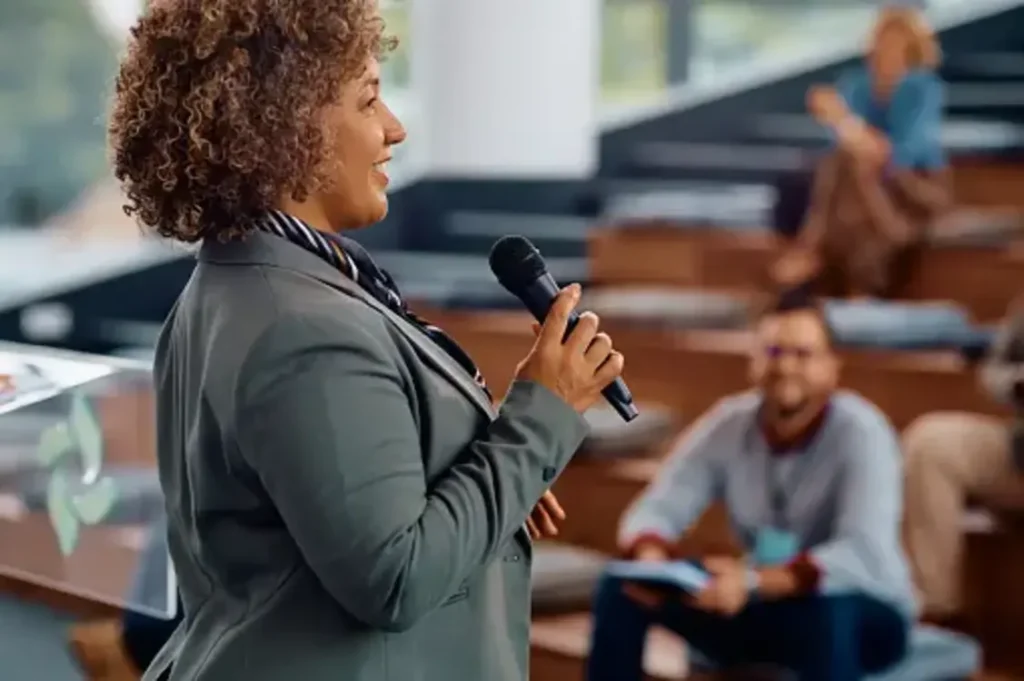Public speaking is an essential skill that holds the power to inform, inspire, and influence others. Malcolm Gladwell’s concept of the 10,000-Hour Rule, popularized in his book “Outliers,” suggests that achieving mastery in any field demands approximately 10,000 hours of dedicated practice. But how does this principle apply to the realm of public speaking? In this discussion, we’ll explore how the 10,000-Hour Rule relates to mastering public speaking, delve into the specific skills and techniques that one would need to practice for thousands of hours to achieve proficiency, outline a plan for accumulating 10000 hours in public speaking, examine notable examples of individuals who have applied this rule to become exceptional public speakers and consider alternative paths to proficiency in public speaking.
- What Is The 10,000-Hour Rule?
- How Does The 10,000-Hour Rule Relate To Mastering Public Speaking?
- Checklist For 10,000-Hour Mastery In Public Speaking
- A Plan For Accumulating 10,000 Hours Of Practice In Public Speaking.
- Case Studies Of Individuals Who Have Applied The 10,000-Hour Rule To Become Exceptional Public Speakers.
- Conclusion
What Is The 10,000-Hour Rule?
The 10,000-Hour Rule, as popularized by Malcolm Gladwell, posits that becoming a master in any field requires roughly 10,000 hours of dedicated practice. In the realm of public speaking, this means committing substantial time to hone various aspects such as content creation, delivery techniques, audience engagement, and overcoming stage fright. This rule underscores the importance of consistent effort and deliberate practice over an extended period. While the exact number of hours may vary depending on individual factors, the principle remains a guiding framework for those aspiring to excel in public speaking.
How Does The 10,000-Hour Rule Relate To Mastering Public Speaking?
Mastering the art of public speaking is often considered an impressive task, requiring a blend of confidence, skill, and charisma. Yet, Malcolm Gladwell’s concept of the 10,000-Hour Rule sheds light on the path to proficiency in this domain. As Gladwell popularized in his book “Outliers,” the rule suggests that achieving expertise in any field demands approximately 10,000 hours of dedicated practice. How does this principle apply to the realm of public speaking?
At its core, the 10,000-Hour Rule underscores the significance of deliberate and sustained effort in skill acquisition. For aspiring speakers, this translates into a journey of continuous learning and refinement. Let’s delve deeper into how this rule relates to mastering public speaking:
1. Deliberate Practice:
The essence of the 10,000-Hour Rule lies in the concept of deliberate practice – a purposeful and focused effort aimed at improvement. In the context of public speaking, this entails not merely delivering speeches, but actively working on various aspects of communication, such as vocal delivery, body language, and content organization.
2. Skill Development:
Public speaking mastery encompasses a myriad of skills, from articulation and vocal modulation to audience engagement and storytelling. Each of these skills requires time and practice to develop. By dedicating thousands of hours to honing these abilities, speakers can refine their craft and command the stage with confidence.
3. Experience Accumulation:
The 10,000-Hour Rule acknowledges the role of experience in skill acquisition. Through countless hours of practice, speakers encounter diverse audiences, navigate different speaking contexts, and refine their approach based on feedback and reflection. This accumulation of experience is invaluable in cultivating the adaptability and resilience needed to excel in public speaking.
4. Iterative Improvement:
Mastery is not achieved overnight but through incremental progress over time. By adhering to the 10,000-Hour Rule, speakers embrace a mindset of continuous improvement. They recognize that each practice session offers an opportunity to refine their techniques, address weaknesses, and push the boundaries of their comfort zone.
5. Confidence Building:
Confidence is a cornerstone of effective public speaking. As speakers invest thousands of hours in practice, they not only polish their technical skills but also cultivate the self-assurance needed to command the stage. With each successful presentation and each constructive critique, their confidence grows, empowering them to connect authentically with their audience.
By embracing the principles of deliberate practice, skill development, and iterative improvement, speakers can navigate the path to mastery with clarity and purpose. While the road may be long and challenging, the destination – the ability to inspire, inform, and influence through the power of speech – makes the journey worthwhile.
Checklist For 10,000-Hour Mastery In Public Speaking
To embark on a journey toward mastering public speaking, one must understand the specific skills and techniques that constitute this multifaceted art form. Here’s a breakdown of the key areas that would benefit from extensive practice to accumulate 10,000 hours toward mastery:
1. Articulation and Pronunciation:
- Practice exercises to improve clarity and precision in speech.
- Focus on enunciating consonants and vowels effectively.
- Work on pronouncing challenging words and phrases fluently.
2. Vocal Variety and Modulation:
- Experiment with different tones, pitches, and volumes to convey emotions and emphasis.
- Practice controlling the pace and rhythm of speech to maintain audience engagement.
- Work on using pauses strategically for emphasis and impact.
3. Body Language and Nonverbal Communication:
- Practice maintaining an open and confident body posture on stage.
- Use gestures to enhance verbal communication and emphasize key points.
- Pay attention to facial expressions to convey authenticity and connection with the audience.
4. Content Organization and Structure:
- Learn techniques for structuring speeches effectively, such as the introduction-body-conclusion format.
- Practice creating compelling openings to grab the audience’s attention.
- Develop clear and logical transitions between ideas to maintain coherence.
5. Audience Engagement and Interaction:
- Practice techniques for connecting with the audience, such as eye contact and addressing individuals directly.
- Incorporate interactive elements, such as questions, polls, or anecdotes, to keep the audience engaged.
- Develop the ability to read audience cues and adjust your delivery accordingly.
6. Storytelling and Narrative Techniques:
- Study the principles of storytelling and apply them to your speeches to create memorable narratives.
- Practice incorporating vivid imagery, descriptive language, and emotional resonance into your storytelling.
- Experiment with different storytelling formats, such as personal anecdotes, case studies, or historical narratives.
7. Persuasion and Argumentation:
- Learn persuasive speaking techniques, such as establishing credibility, appealing to emotions, and using evidence effectively.
- Practice structuring persuasive arguments with clear claims, supporting evidence, and compelling reasoning.
- Develop the ability to anticipate and address counterarguments to strengthen your persuasive case.
8. Managing Nervousness and Anxiety:
- Practice relaxation techniques, such as deep breathing and visualization, to manage pre-speech nerves.
- Gradually expose yourself to increasingly challenging speaking situations to desensitize yourself to anxiety.
- Develop coping strategies for handling unexpected challenges or distractions during presentations.
9. Audience Analysis and Adaptation:
- Learn to assess your audience’s demographics, interests, and knowledge levels to tailor your message effectively.
- Practice adapting your language, examples, and delivery style to resonate with different audience groups.
- Develop empathy and sensitivity to cultural differences and adjust your communication accordingly.
10. Continuous Learning and Feedback:
- Cultivate a mindset of continuous improvement by seeking opportunities for learning and growth.
- Solicit feedback from peers, mentors, or professional coaches to identify areas for improvement.
- Reflect on your performances and actively incorporate feedback into your practice routine.
By dedicating thousands of hours to practicing and refining these specific skills and techniques, aspiring public speakers can progress along the path toward mastery. While the journey may be challenging, the rewards of becoming a confident, impactful communicator are immeasurable.
A Plan For Accumulating 10,000 Hours Of Practice In Public Speaking?
Embarking on a journey to accumulate 10,000 hours of practice in public speaking is a significant undertaking that requires dedication, perseverance, and a well-structured plan. Here’s a comprehensive plan for someone aiming to achieve this ambitious goal:
1. Set Clear Goals:
- Define specific, measurable goals for your public speaking journey, such as improving vocal delivery, enhancing storytelling abilities, or overcoming stage fright.
- Break down your overarching goal of accumulating 10,000 hours into smaller milestones to track your progress along the way.
2. Establish a Practice Schedule:
- Dedicate regular time slots for public speaking practice in your daily or weekly schedule.
- Aim for consistency by committing to practicing at least several times per week, if not daily, to maximize progress.
3. Structured Practice Sessions:
- Plan structured practice sessions that focus on different aspects of public speaking, such as vocal delivery, content creation, and audience engagement.
- Allocate time within each session for warm-up exercises, skill drills, and performance practice.
4. Variety in Practice Activities:
Incorporate a variety of practice activities to keep your sessions engaging and effective. This could include:
- Speech rehearsals: Practice delivering prepared speeches on a variety of topics.
- Impromptu speaking: Challenge yourself with impromptu speaking exercises to improve spontaneity and adaptability.
- Feedback sessions: Seek feedback from peers, mentors, or online communities to identify areas for improvement.
- Video analysis: Record and review your practice sessions to evaluate your performance and track progress over time.
5. Explore Different Speaking Contexts:
Seek opportunities to practice public speaking in different contexts and settings, such as:
- Toastmasters clubs: Join a local Toastmasters club to participate in structured speaking opportunities and receive constructive feedback.
- Workshops and seminars: Attend public speaking workshops or seminars to learn new techniques and gain exposure to diverse speaking styles.
- Online platforms: Utilize online platforms such as webinars, podcasts, or virtual speaking events to reach wider audiences and hone your skills.
6. Continuous Learning and Improvement:
- Invest in ongoing learning and professional development to expand your knowledge and skills in public speaking.
- Read books, listen to podcasts, and watch TED talks or other inspirational speeches to gain insights and inspiration from accomplished speakers.
- Stay updated on industry trends, best practices, and emerging technologies related to public speaking.
7. Track Progress and Adjust Accordingly:
- Regularly assess your progress toward your 10,000-hour goal and adjust your practice plan as needed.
- Celebrate milestones along the way to stay motivated and reinforce your commitment to continuous improvement.
8. Cultivate Resilience and Perseverance:
- Recognize that mastering public speaking is a journey filled with ups and downs, successes and setbacks.
- Cultivate resilience by embracing challenges as opportunities for growth and learning.
- Stay committed to your goal, even when faced with obstacles or moments of self-doubt.
By following this structured plan and committing to consistent practice over time, you can gradually accumulate the 10,000 hours of practice needed to achieve mastery in public speaking. Remember, every hour spent honing your skills brings you one step closer to becoming a confident, impactful communicator.
Case Studies Of Individuals Who Have Applied The 10,000-Hour Rule To Become Exceptional Public Speakers.
Several notable individuals have exemplified the principles of the 10,000-Hour Rule in their journey to becoming exceptional public speakers. Here are a few compelling examples:
1. Barack Obama:
Before becoming the 44th President of the United States, Barack Obama honed his public speaking skills through years of practice and experience.
Obama’s eloquence and ability to connect with audiences were evident throughout his political career, from his early days as a community organizer to his historic presidential campaigns and beyond.
His renowned speeches, such as his keynote address at the 2004 Democratic National Convention and his inaugural addresses, have been lauded for their rhetorical brilliance and emotional resonance.
Obama’s dedication to mastering public speaking, coupled with his natural charisma and leadership abilities, exemplifies the transformative power of deliberate practice.
2. Martin Luther King Jr.:
Reverend Dr. Martin Luther King Jr. is widely regarded as one of the greatest orators in American history, known for his stirring speeches and impassioned advocacy for civil rights.
King’s iconic “I Have a Dream” speech, delivered during the 1963 March on Washington for Jobs and Freedom, remains one of the most influential and celebrated speeches of the 20th century.
Throughout his leadership of the Civil Rights Movement, King traveled extensively, delivering countless speeches and sermons to diverse audiences across the country.
King’s mastery of public speaking was the result of years of dedicated practice and refinement, as he honed his message, delivery, and rhetorical techniques to inspire millions and effect social change.
3. Winston Churchill:
Sir Winston Churchill, the British statesman and Prime Minister during World War II was renowned for his powerful oratory and leadership in times of crisis.
Churchill’s wartime speeches, such as his “We Shall Fight on the Beaches” address and his “Blood, Toil, Tears, and Sweat” speech, galvanized the British people and rallied support for the war effort.
Throughout his political career, Churchill cultivated his public speaking skills through extensive practice and study of rhetoric, drawing inspiration from classical orators and literary figures.
Churchill’s mastery of language, his command of the podium, and his ability to inspire confidence and resolve in the face of adversity serve as a testament to the transformative impact of disciplined practice.
4. Oprah Winfrey:
Oprah Winfrey, the media mogul, philanthropist, and talk show host, is celebrated for her ability to engage and connect with audiences through the power of storytelling.
Throughout her decades-long career, Winfrey has interviewed thousands of guests, shared personal stories of triumph and adversity, and inspired millions with her authentic and empathetic approach to communication.
Winfrey’s journey to becoming a master communicator involved years of dedicated practice, as she honed her interviewing skills, developed her on-air persona, and cultivated a deep understanding of her audience.
Through her influential platform, Winfrey has demonstrated the profound impact that effective communication can have in empowering individuals, fostering empathy, and driving positive change.
These exemplary individuals serve as inspiring reminders of the transformative potential of deliberate practice in mastering the art of public speaking. Their dedication, perseverance, and commitment to excellence stand as a testament to the enduring power of the 10,000-Hour Rule in shaping exceptional communicators and leaders.
Conclusion
When it comes to getting good at public speaking, it’s not just about practicing a lot. Sure, practicing a ton, as Gladwell says with his 10,000-Hour Rule, is super important. But there are also other ways to get better at it. Like taking part in special training programs, having a mentor to guide you, or even just getting out there and speaking in different situations.
Look at famous speakers like Barack Obama or Martin Luther King Jr. They didn’t just magically become great speakers overnight. They put in a lot of practice and learned from their experiences along the way. And even if you can’t hit exactly 10,000 hours of practice, that’s okay. What matters is that you keep trying, keep learning, and keep getting better. So, whether it’s through practice, training, or learning from others, anyone can become a better public speaker with time and effort. Check this out to gain more insights!





